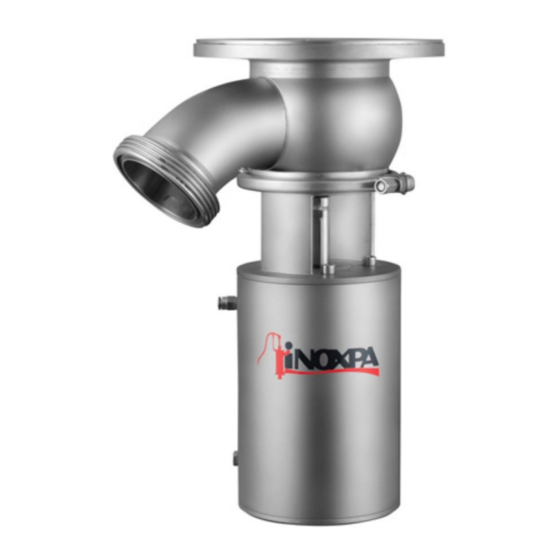Table of Contents
Advertisement
Quick Links
ANNEX FOR CE MARKED EQUIPMENT ACCORDING TO THE
INNOVA F Ex TANK BOTTOM VALVE
The content of this Annex supplements the information in the instruction
manual. The instructions in this Annex must be taken into account in
conjunction with the equipment marked according to Directive
2014/34/EU.
This Annex is complemented, if applicable, by the manuals of the
ATEX-certified components comprising the assembly.
INSTALLATION, SERVICE AND
MAINTENANCE INSTRUCTIONS
ATEX DIRECTIVE 2014/34/EU:
1
Original Manual
10.248.30.07EN
(0) 2022/11
Advertisement
Table of Contents

Subscribe to Our Youtube Channel
Summary of Contents for INOXPA INNOVA F Ex
- Page 1 ANNEX FOR CE MARKED EQUIPMENT ACCORDING TO THE ATEX DIRECTIVE 2014/34/EU: INNOVA F Ex TANK BOTTOM VALVE The content of this Annex supplements the information in the instruction manual. The instructions in this Annex must be taken into account in conjunction with the equipment marked according to Directive 2014/34/EU.
- Page 2 10.248.30.08EN (0) 2022/11 EU Declaration of Conformity ATEX 2014/34/EU INOXPA, S.A.U. Telers, 60 17820 – Banyoles (Girona) Hereby declare under our sole responsibility that the machine BOTTOM TANQUE VALVE Model INNOVA F From serial number IXXXXXXXXX IXXXXXXXXX Fulfills all the relevant provisions of Safety and Health from ATEX 2014/34/EU Directive...
-
Page 3: Safety
The valve was selected according to the working conditions specified by the user, therefore INOXPA is not responsible for any damage that may occur due to the use of valve under conditions other than those stated in the order 1.4.3. - Page 4 - The material has been badly used or has not been used according to the conditions for working in the classified zone, in a different classified zone, in temperature or pressure conditions and/or different substance. _______________________________________________________________________________________________ ED. 2022/11 1. SAFETY VALVE of TANK BOTTOM...
-
Page 5: Table Of Contents
2. Table of Contents The instructions provided in these sections of this Annex should be taken into account jointly with the valve manual. 1. Safety 1.1. Instruction Manual 1.2. Implementation instructions 1.3. Safety 1.4. General safety instructions 2. Table of Contents 3. -
Page 6: Installation
4. Installation 4.1. DELIVERY OF THE VALVE It should be checked that the valve received is adjusted to the working conditions in the classified zone as well as the order conditions 4.3. IDENTIFICATION ATEX valves should be identified in a complementary manner: II 2G Ex h IIB T6…T3 Gb II 2D Ex h IIIB T85ºC…T200 C Db... -
Page 7: Start-Up
The valve was selected for certain working conditions in potentially explosive atmospheres at the time of placing the order. INOXPA is not liable for any damage that may arise if the information provided by the buyer is incomplete or incorrect (liquid type, viscosity, classification of the potentially explosive area, gas generated by the potentially explosive atmosphere, etc.) -
Page 8: Maintenance
If the spare parts are not requested in this way, INOXPA shall not be responsible for the case that the valve may not operate with parts which are not suitable for the classified zone where is installed. - Page 9 7. Finish unscrewing the plug stem by hand. 8. Once the plug stem is out, remove the body cap (12) and the seals inside it (20B and 05) 9. Extract the guide bushing (17) and the scraper (60), and take out the washer with the electrical continuity connection cable.
-
Page 10: Technical Specifications
8. Technical Specifications Temperature range. See section 4.3. PNEUMATIC ACTUATOR GENERAL DATA The pneumatic actuator cannot exceed, under any circumstances, the 12 cycles per minute to ensure that there is no significant increase in temperature. In any case, in ongoing work it is not recommended to exceed the 2/3 cycles per minute to ensure a reasonable life of the seal.












Need help?
Do you have a question about the INNOVA F Ex and is the answer not in the manual?
Questions and answers